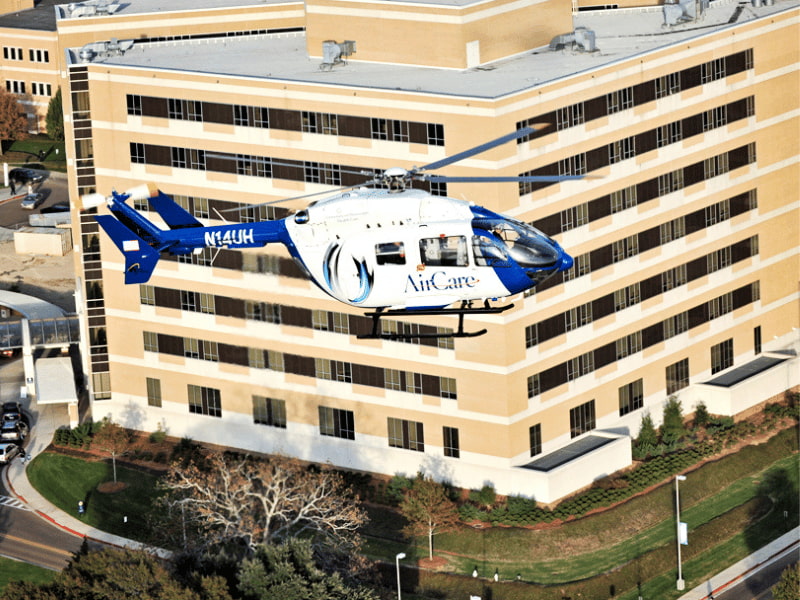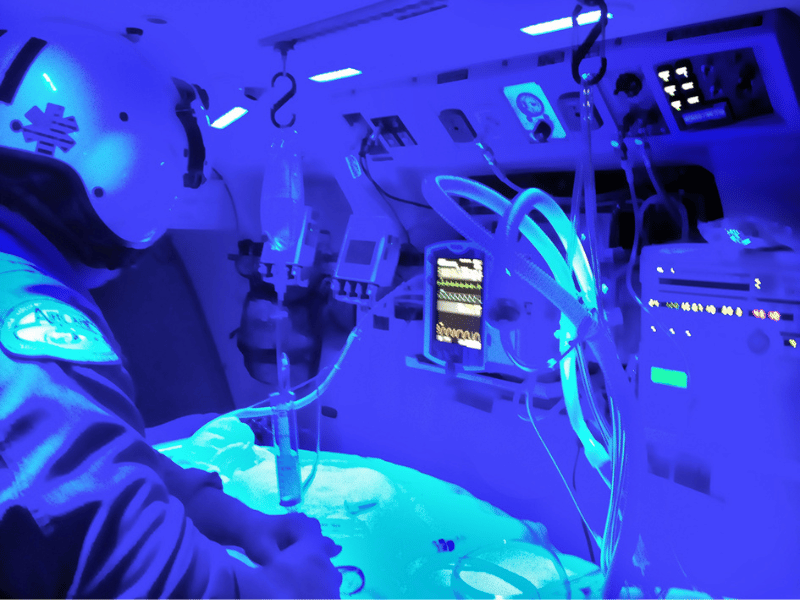AirCare's critical care paramedics to offer advanced life-saving care

In some instances, a patient might need a chest tube inserted, or drugs that will lower dangerously high blood pressure or address a raging infection – all examples of care that until recently, Mississippi paramedics weren’t allowed to give.
Such procedures now can be performed by eight of AirCare’s 15 full- and part-time paramedics. They’ve just graduated from a pilot program on the Ridgeland campus of Holmes Community College, in collaboration with clinical areas at UMMC, to become critical care paramedics pending their certification later this month. That training opportunity is giving new meaning to enhanced care delivered by paramedics in Mississippi, especially those who are part of medical flight crews.
“We’ve been watching and waiting, and when this course firmed up, we had as many people as possible participate,” Donna Norris of Flowood, AirCare’s program manager, said of the inaugural 14-member class.
The state Legislature in 2013 allowed the licensing of critical care paramedics. Graduates of the one-semester class, which includes many hours of both classroom and hands-on training, must be certified by the state Department of Health’s Bureau of Emergency Medical Services.

The certification, expected later this month, means an immediate enhancement of care for patients served by AirCare, Norris said. Each AirCare flight team includes a registered nurse, a paramedic and the pilot; five of AirCare’s 14 nurses also are paramedics, and two of AirCare’s paramedics also are nurses. Up to two patients can be transported to UMMC per flight.
“We don’t fly with physicians, but if we were at the scene of an accident and a patient needed a chest tube to save their life, our team would be able to complete that,” Norris said. “The Bureau of Emergency Medical Services recognized this void in the professional scope of practice.”
AirCare is Mississippi’s only medical flight team that operates statewide and the only program that transports adults, children and infants. It’s also the only program utilizing isolettes for premature and ill infants and the sole program that carries blood products and an ultrasound, Norris said.
“These paramedics are already actively taking care of sick patients, and this course will only enhance their capabilities,” said Mark Galtelli, Holmes’ program director of emergency medical technology. “They will treat the sickest of the sick.”
Procedures that certified critical care paramedics can provide to patients in transport “can make a huge difference in a patient’s life,” said new critical care paramedic Stephen Houck of Gluckstadt, an AirCare team member for the last three years and a paramedic since 2006. “The scope of practice is one of the most advanced in the country.”

The bar was raised through a very rigorous framework of classroom instruction and hands-on clinical experience, said Jeremy Benson of Flowood, a new critical care paramedic and Jackson base manager for AirCare. AirCare also operates a helicopter out of Meridian.
“We practiced skills and procedures in the lab, and as opportunities came about, we’d do that on real patients,” said Benson, a paramedic for 10 years, the last six with AirCare. “We also had high-fidelity simulation lab experience as well as cadaver training to augment that.”
“It’s as advanced as you can get,” Galtelli said of the course, which requires 90 hours of hands-on training. “It’s highly technical and highly repetitious.”
The training didn’t come without sacrifice. With eight of AirCare’s paramedics constantly in class or training during the spring semester, their fellow paramedics had to rally around them.
“When you look at the manpower and the hours, my team became very creative in scheduling, because this is important for the whole team. While our nurses weren’t sitting in the classes, they will benefit from this,” Norris said. “This training is the expectation going forward.”
Flight paramedics can always “go back and look at what we could have done better” with critical care certification, Benson said. “With these skills and knowledge, we’ll be prepared for the next scenario. This will give us more to give back to our patients.”
“This is just another example of the strength of the Medical Center’s investment in the AirCare program,” Norris said. “Our desire to have all of our paramedics as critical-care credentialed is another distinguishing feature that sets AirCare apart from others.”
AirCare by the numbers:
1996 – AirCare created.
2.5 million-plus – miles flown
17,000-plus – patients transported
15 – paramedics, 8 of them critical care trained
2 – helicopters, one stationed in Jackson, one in Meridian
3 – team members per flight: a paramedic, registered nurse and pilot
2 – maximum number of patients per copter
AirCare in Jackson flies the 2010 year model American Eurocopter EC145, the civilian variant of the U.S. Army's Lakota (UH-72A), currently produced at Eurocopter's facility in Columbus. AirCare in Meridian operates a 2008 model EC 135 P2+


